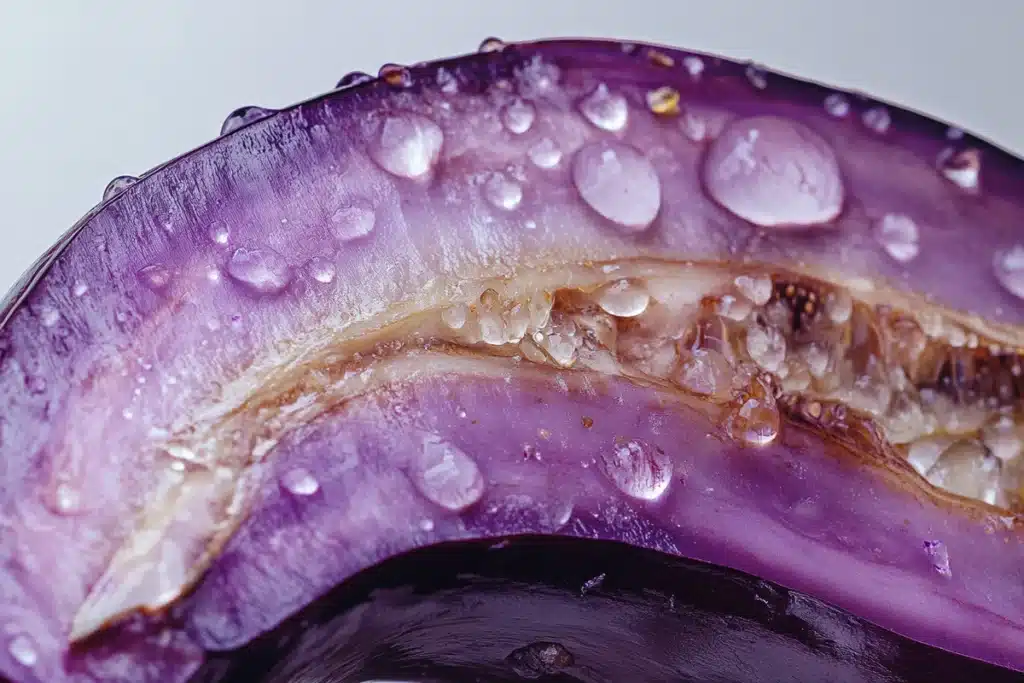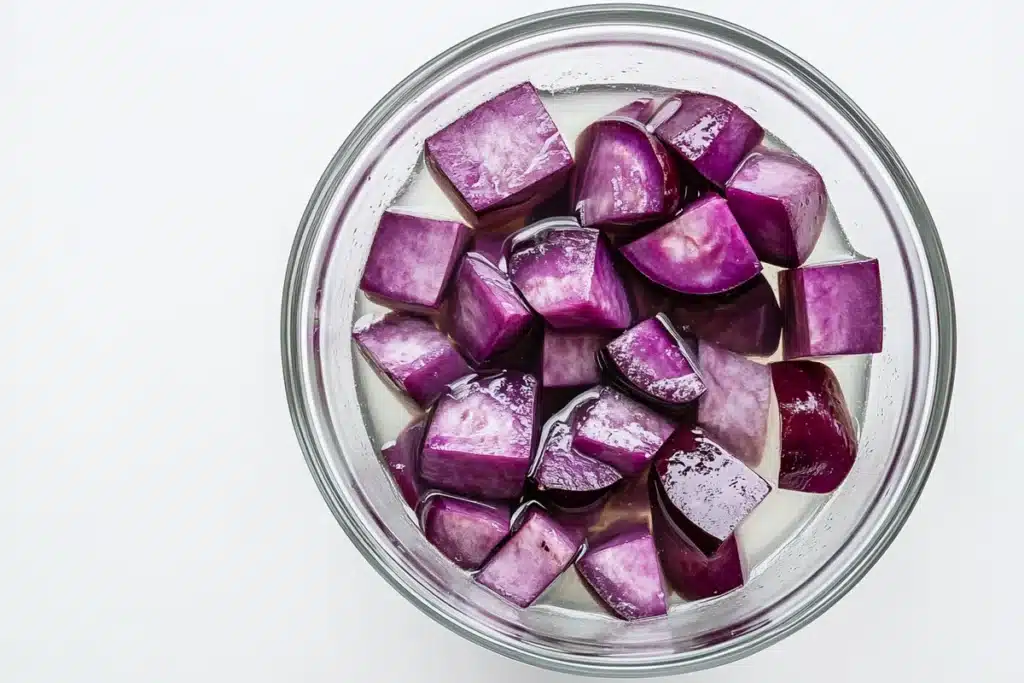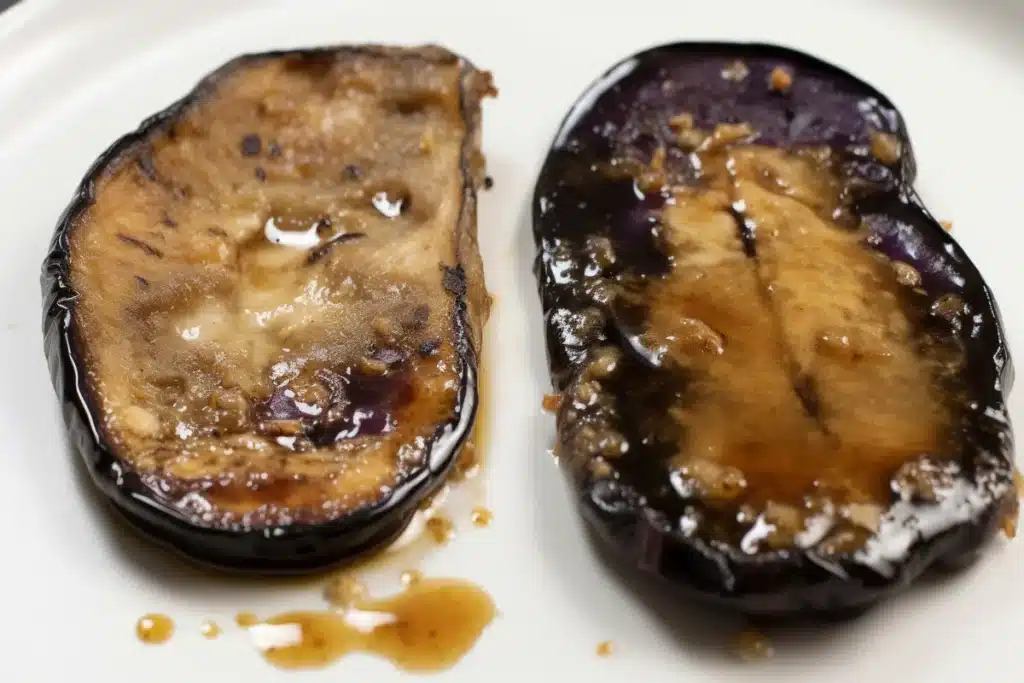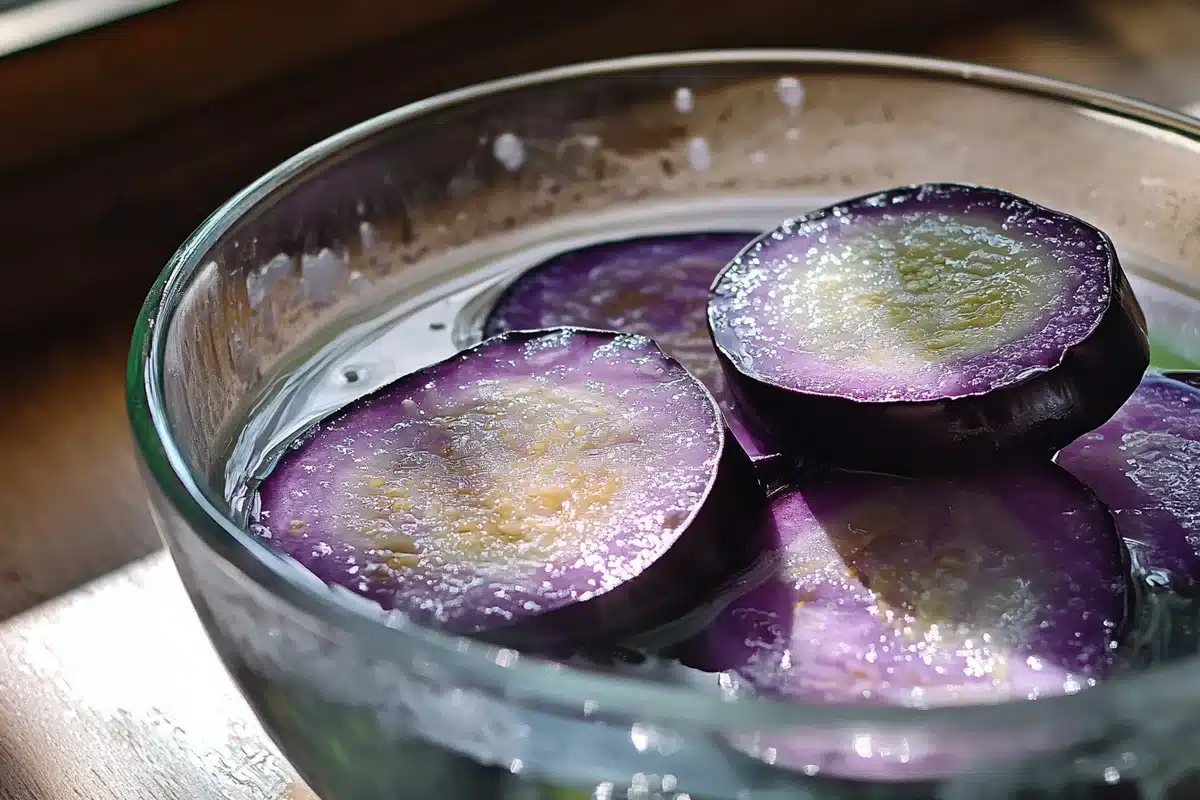This article explores the question, “Why do you soak eggplant in water before cooking?”, providing a detailed guide on this common practice. Let’s find out the best method and answer the question, “Why do you soak eggplant in water before cooking?”.
Many cooks wonder, “why do you soak eggplant in water before cooking?”. This article will explore this technique, offering insight into why it’s so helpful and how you can best use it. Therefore, let’s learn about the importance of soaking eggplant. Thus, you’ll understand how this step can help improve your meals.
Understanding the Need to Soak Eggplant
Before diving into the process, let’s understand why do you soak eggplant in water before cooking. Specifically, soaking eggplant is done to reduce bitterness, improve texture, and also prevent excessive oil absorption during cooking. Also, these are important steps that will greatly improve your overall cooking results, especially when you are trying to understand why do you soak eggplant in water before cooking? Therefore, understanding the reasons will help you decide when soaking is needed. Thus, this knowledge will make you a more informed cook. Ultimately, understanding these aspects will help you use this technique properly, and will give you the full answer to the question, “why do you soak eggplant in water before cooking?”.
Common Issues with Eggplant
Eggplant, while delicious, can sometimes have a bitter taste, which is why it is useful to consider “why do you soak eggplant in water before cooking?”. Specifically, this bitterness is due to compounds inside the vegetable and is something that can be reduced before you start to cook. Also, some methods of cooking can make it absorb more oil and also become very mushy, which is another reason that people consider “why do you soak eggplant in water before cooking?”.
Therefore, if these issues are not handled correctly, you will find that your meals are greatly affected. Thus, understanding how to reduce these issues will improve the way you work with eggplant. Ultimately, knowing these issues and how to handle them is vital to your cooking success.

How Soaking Helps Eggplant
Soaking eggplant can help reduce bitterness, and also help it to achieve a better texture. Specifically, soaking allows the bitter compounds to leach into the water, while improving the overall texture. Also, this is a very easy step that can be done before all types of cooking. Therefore, this will help to improve the overall quality of your meal. Thus, this simple action can make a big difference in the final result. Ultimately, it’s all about the initial steps.
The Process of Soaking Eggplant Properly
Now, let’s explore how to properly soak eggplant. Specifically, this process is actually very easy, but it is very important to do it correctly. Also, this is a common step that you can add into your own cooking processes. Therefore, it is helpful to know the right steps to follow for the best results. Thus, with a little practice, you can easily add this step into your routine. Ultimately, this is a simple step that will help improve all of your meals using eggplant.
Preparing Eggplant for Soaking
Before soaking, you need to prepare the eggplant. Specifically, you need to wash the eggplant and then slice or cube it according to your recipe’s requirements. Also, if the eggplant is not cut, then the water will not be able to reach all the pieces. Therefore, this is a very important first step that you should take before you start soaking. Thus, do this step correctly to ensure that you get the best results. Ultimately, proper preparation is always a must for any recipe.
Soaking the Eggplant in Water
To soak the eggplant, you must submerge the cut eggplant into a bowl of cold water. Specifically, you need to add in a bit of salt, as this helps to draw out the moisture. Also, make sure all of the pieces are submerged, and also that they stay down during the soaking process. Therefore, the water level and the use of salt is very important for maximum effectiveness. Thus, this will ensure that the eggplant soaks evenly. Ultimately, this will make the eggplant softer and less bitter.

Duration of Soaking Time
The eggplant should be soaked for at least 30 minutes, but you can also soak it for up to 1 hour. Specifically, the longer soak time may help to remove even more bitterness. Also, it depends on your taste preferences, and the specific type of eggplant that you are using. Therefore, you can experiment with your soaking times and see what you like best. Thus, try different times to get a sense of how the soaking affects the results. Ultimately, you need to know how much time you need for your best outcome.
Benefits of Soaking Eggplant: More Than Just Taste
Soaking eggplant offers a few benefits beyond just improving the taste, and knowing these can help with your cooking. Specifically, it can also help to improve the texture and also the overall cooking experience as well. Also, these benefits will help you create a better meal and also make your cooking process easier. Therefore, understanding these points will help you when deciding if you should soak your eggplant. Thus, the benefits are beyond just flavor and will help with other aspects of your meal. Ultimately, this is a useful step to make sure that your food is the best that it can be.
Reducing Bitterness for a More Pleasant Taste
One of the main benefits is that soaking reduces the eggplant’s bitterness. Specifically, this leads to a more pleasant eating experience. Also, it makes the dish better for serving even those who are sensitive to bitterness. Therefore, this is a great way to enhance the taste of your meal. Thus, this can also help you get more satisfaction from eating it. Ultimately, taking this step is always helpful.
Improving the Texture of Cooked Eggplant
Soaking also helps to improve the texture of cooked eggplant. Specifically, it prevents the eggplant from absorbing too much oil, and helps to maintain a better and more firm consistency. Also, this will help to reduce the amount of moisture in the eggplant before it is cooked. Therefore, this method is key to creating a better texture for any cooked eggplant dish. Thus, it helps prevent them from getting too mushy or soggy. Ultimately, this creates a texture that is very appealing.
Preventing Excessive Oil Absorption
Soaking eggplant also helps to prevent the eggplant from absorbing too much oil during cooking. Specifically, this results in a lighter and less greasy result. Also, this is also an important technique to keep your meal from being too oily. Therefore, if you’re watching your oil consumption, this is a very simple but very effective way to improve your meal. Thus, this will also help to enhance the overall flavor as well. Ultimately, this simple step will help to make your meal that much healthier.

“What is baingan bharta in english?” – A Related Concept
When learning about eggplant preparation, you might also be wondering, “What is baingan bharta in english?”. Specifically, baingan bharta is a dish that uses eggplant, and is often one that is often prepared with this soaking technique. Also, it is good to know all of the different points when exploring eggplant preparation. Therefore, let’s take a moment to look at the English version of this dish. Thus, you can make more connections between these two ideas. Ultimately, you will then have a better grasp of all concepts.
The Common Translation of Baingan Bharta
The common translation of “baingan bharta” into English is mashed eggplant. Specifically, this name reflects the way the eggplant is often prepared in this dish. Also, it is often cooked and then mashed, making the translation a fairly straightforward concept to grasp. Therefore, understanding what it is in English will help with all of the other information you are exploring. Thus, this simple translation offers some insight into the dish itself. Ultimately, learning this information will help you understand eggplant cooking in general.
Recognizing Different Cooking Methods
Even if it’s called mashed eggplant, you will see different ways of cooking it. Specifically, this dish is often made with a variety of different spices, and cooked in different methods, such as roasting or grilling. Also, it’s useful to remember this while you are exploring new cooking techniques. Therefore, while the core idea might be the same, the cooking process may also be slightly different. Thus, you should always be open to all types of preparations and techniques. Ultimately, this will also help you understand the different ways that eggplant can be cooked.
“Is it better to soak the eggplant before cooking?” – Evaluating the Benefits
When thinking about all the various techniques, you might also wonder, “Is it better to soak the eggplant before cooking?”. Specifically, while not every single recipe will require this step, it is a good idea to see what the best approach will be for you. Also, it often comes down to personal preference and the specific dish you are planning to make. Therefore, let’s consider some points for and against soaking. Thus, you will be able to make the most informed choices in your kitchen. Ultimately, it is all about finding the best method for your overall cooking experience.
The Benefits of Soaking
The benefits of soaking are very useful for many eggplant dishes. Specifically, this includes reducing bitterness, and improving texture by reducing the overall moisture, and this will help you when you are trying to decide if you need to soak. Also, it also can help prevent excessive oil absorption and will create a lighter meal. Therefore, if these benefits are needed, you will want to be sure to add this step into your routine. Thus, this can all help to elevate your meals to the next level. Ultimately, it’s useful to add this technique into your cooking routine.
Considering Time and Preparation
While soaking eggplant does offer many benefits, it also requires some extra time and preparation, and that might be a drawback to this approach. Specifically, if you are in a hurry or have limited time, you might want to skip this step. Also, some recipes might not require it to have the best taste, so sometimes it can be skipped. Therefore, it all depends on your personal needs and preferences. Thus, it might be useful to think about these points when you are meal planning. Ultimately, it’s about doing what is best for your overall goals.
“How do you soak eggplant to get rid of bitterness?” – Effective Methods
Many are specifically interested in, “How do you soak eggplant to get rid of bitterness?”. Specifically, understanding the best method is the key to getting the best results. Also, knowing exactly how to do it can help improve the overall cooking experience. Therefore, let’s explore some specific methods to get this technique done right. Thus, this will help you control the flavor of your food. Ultimately, this will greatly help you in your eggplant preparation.
Using Salted Water
Using salted water is the best way to soak eggplant and reduce bitterness. Specifically, the salt will help to draw out the moisture and also the bitter compounds. Also, make sure to use enough salt so that you get a very effective soaking experience. Therefore, this approach is key to a proper soak. Thus, this is a simple way to improve the flavor. Ultimately, this will create a better end product.
Submerging Completely
It’s important to make sure that all the pieces of eggplant are completely submerged in the water. Specifically, this can be achieved by using a plate or bowl to weigh down the eggplant, and keep everything covered. Also, this will help to ensure that all of the eggplant is soaked. Therefore, this is another key step for best results, and will ensure even soaking of all items. Thus, submerging all of the eggplant will prevent any parts from drying out. Ultimately, it will help to create an even result.
Soaking Time and Water Temperature
It’s also useful to note that the water should be cold for soaking, as this will also improve the overall results. Specifically, you can add some ice cubes to help keep the water cold. Also, it is good to soak for at least 30 minutes, or for as long as 1 hour. Therefore, these details about time and also temperature are vital to reducing bitterness. Thus, use cold water to ensure the eggplant is kept at its best. Ultimately, keeping the temperature cold is important for the best results.
“What is the secret to cooking eggplant?” – Tips for Success
While soaking is important, many also ask, “What is the secret to cooking eggplant?”. Specifically, beyond soaking, there are other things that will enhance your cooking, especially with eggplant. Also, it’s helpful to learn from those who have the most experience with eggplant. Therefore, let’s explore a few methods that will help you in your overall culinary endeavors. Thus, this knowledge will help you take your cooking skills to the next level. Ultimately, it will help you to create new and interesting dishes.
Roasting or Grilling for Enhanced Flavor
Roasting or grilling are often the best methods for eggplant. Specifically, these approaches add a delicious smoky flavor that is perfect for many recipes. Also, you should also ensure that the eggplant is cooked until it is tender, and then mash or cut it, according to your needs. Therefore, this technique is best for all different kinds of recipes, and provides the greatest taste. Thus, this type of cooking will bring out the natural sweetness and taste. Ultimately, it’s a great choice for a variety of dishes.
Using Proper Seasoning and Flavor Enhancements
Proper seasoning is also a key part of cooking eggplant properly. Specifically, you can use fresh herbs and spices like garlic, cumin, or chili powder to enhance the flavor. Also, you should also think about the use of acid, such as lemon juice or vinegar, to help create more harmonious flavors. Therefore, proper seasoning can make a huge difference to any kind of dish. Thus, this method of cooking will help you to get the best results. Ultimately, this also makes for a dish that is more interesting and more flavorful overall.
Knowing When Eggplant is Perfectly Cooked
Finally, you need to know what perfectly cooked eggplant looks like. Specifically, it should be tender, and also easily pierced with a fork. Also, if it’s roasted or grilled, then it will have a slight char and also smoky flavor. Therefore, knowing what the best texture and appearance should be will make a big difference in the end result. Thus, this knowledge will help you cook the meal to its maximum potential. Ultimately, knowing this will ensure your eggplant is properly cooked each and every time.
“What happens if you don’t salt eggplant before cooking?” – The Results
Finally, many also ask, “What happens if you don’t salt eggplant before cooking?”. Specifically, while it is not always required, it often helps to improve the overall texture and also the flavor of eggplant. Also, it is one way to get the most out of your meal. Therefore, let’s explore a few of the different outcomes. Thus, you’ll better understand why you might want to add this step. Ultimately, it will help you make the most informed choices for your cooking routine.
Potential Bitterness and Texture Issues
If you choose not to salt the eggplant, there is a possibility that it may still taste bitter, and the texture may not be the best as well. Specifically, the lack of salt can allow the moisture to still remain in the vegetable, and make it a bit mushy. Also, you also will not have removed any of the naturally occurring bitter compounds. Therefore, not salting is one reason that your dish might not have the taste you desire. Thus, this technique helps to improve the eggplant’s flavor and texture overall. Ultimately, it’s the best way to get the best results.
Changes to the Cooking Process
Not salting eggplant can also affect the cooking process as well. Specifically, if the water is not removed from the eggplant, then it will absorb more oil, or it can also lead to a more watery result in your meal. Also, both of these are not often desired, depending on the dish. Therefore, this will lead to some variations in both the texture and the overall result. Thus, salting beforehand is what helps to avoid any unwanted issues. Ultimately, it also has a big impact on the overall final outcome.
Still Delicious Meals Without Salting
While it’s a useful technique, not salting eggplant does not always mean that your meal will be ruined. Specifically, some dishes might not require it at all, or it may depend on your taste and your preferences. Also, it might also depend on the specific type of eggplant you are using, and also the other items in your meal. Therefore, you may discover that in some instances it does not need to be salted. Thus, it comes down to experimentation. Ultimately, it’s another way to explore your cooking style and to see what you enjoy best.
Conclusion
In conclusion, the question, “why do you soak eggplant in water before cooking?” is answered with simple steps that help to improve both texture and taste. It helps reduce bitterness and also prevents excessive oil absorption. Therefore, this knowledge empowers you to make better choices when cooking and makes the most of each and every step you take in the kitchen. Thus, you will be able to create the best and most delicious meals. Ultimately, following these techniques for bharta recipes will always make a difference in the end result.
Frequently Asked Questions (FAQs):
Is it better to soak the eggplant before cooking?
Soaking eggplant is often useful, as it can help to reduce bitterness, and improve the overall texture of the cooked vegetable.
How do you soak eggplant to get rid of bitterness?
To soak eggplant and reduce bitterness, submerge it in salted cold water for at least 30 minutes.
What is the secret to cooking eggplant?
The secret to cooking eggplant well is to first soak it, and then roast or grill it to help create the best flavor and texture.
What happens if you don’t salt eggplant before cooking?
If you don’t salt eggplant before cooking, it might taste a bit bitter and also might have an undesirable texture, and might also absorb more oil.

